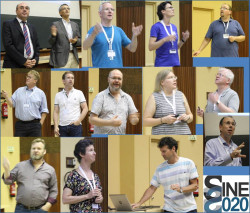95 scientists met in Coimbra for the SINE2020 General Assembly
Sunshine, bacalhau, UNESCO heritage, and interesting scientific discussions all came together at the SINE2020 General Assembly held at the Institute of Physics of the University of Coimbra in Portugal, on September 7-8 2016. 97 scientists met to discuss and learn about the developments of the project’s first year. SINE2020, world-class Science and Innovation with Neutrons in Europe in 2020, is a consortium of 18 partner institutions from 12 countries. It is funded by the European Union through the H2020 programme. Neutrons are used to investigate non-destructively any kind of materials (e.g. how a plant drinks water, a medicine gets delivered, a statue, energy storage). These meetings are extremely important to foster collaboration among all of the 18 partners. *1st day: WP meetings, tour, and dinner* On the first day members of each of the work-packages (WPs) met separately to update each other on the work done so far as well as future steps. Once the meetings were over, we were taken on a guided tour through the University of Coimbra, which is a UNESCO heritage site, and the Museum of Science, which has been classified by the European Physical Society as European Historic Site of Physics. In the evening, we met for a well-deserved dinner with typical Portuguese food. Our hosts surprised us by organizing a small Fado show after dinner with traditional Coimbra songs. *2nd day: General Assembly* To start the second day, we were welcomed by Prof. Luís Neves, the Director of the Faculty of Science and Technology of the University of Coimbra who told us some historical facts about science in Coimbra. The General Assembly opened with a presentation of Mark Johnson, who reviewed the first year of SINE2020. This was his last meeting as SINE2020 coordinator, as he will become the next UK Associate Director of the Institute Laue-Langevin. All WPs coordinators told us about the tasks, aims, and work of their groups. * Thanks to WP2, our website is up and running and articles are already being posted both there and on our social media channels. * WP3 on Education and Training took big steps in creating an e-learning platform for muon spectroscopy as well as developing the existing e-neutrons.org. A number of schools supported by the project are running. * WP4 on Industry has produced a number of outreach materials, attended several industrial events, and received the first proposals for test measurements. * WP5 on Deuteration has multiple facilities advancing in the field and is working on making deuterated material more widely available to European users. * WP6 on Crystal Growth works on making it easier and more efficient to produce large crystals for scientific use. * WP7 on Sample Environment works on improving the environment surrounding samples both on neutron and muon experiments, thus improving data statistics and opening new fields of science. * WP8 on Instrumentation & e-tools is progressing well, having delivered their first milestone on September 6 in Coimbra, the workshop “Neutrons cradle to grave”. * WP9 is developing new Detectors, the first prototypes of which have already been designed, built and tested. * WP10 is working on making Data treatment easier for non-expert users and industry, as well as on having data treatment software ready for use at ESS. They have already organized the first workshop at PSI last spring. To finalise the meeting, we received very useful feedback and suggestions from the Advisory Committee. As a break between the morning and afternoon WPs sessions (and after lunch, of course), Prof. Maria Paula Marques from the Coimbra University gave us the neutron user perspective with her talk on “Shining the Beam on Life Sciences”. She works on life sciences and chemistry and has conducted experiments at ISIS a number of times, e.g. to investigate forensic techniques and anti-cancer drugs. Our hosts and organisers were the team from LIP. Muito obrigado for the good organisation!
Keywords
neutrons, research
Countries
Switzerland, Czechia, Germany, Denmark, Spain, France, Hungary, Italy, Netherlands, Portugal, Sweden, United Kingdom



